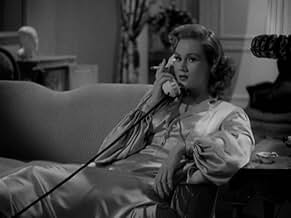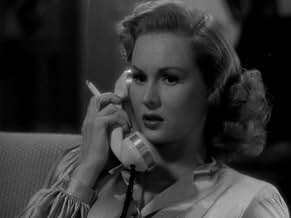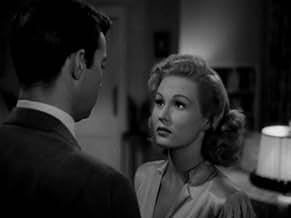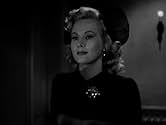IMDb RATING
6.5/10
1.1K
YOUR RATING
Mob attorney Walter Colby is manipulated by showgirl Flaxy Martin into taking the rap for a murder committed by mobster Hap Richie's goons, but he escapes and tries to get revenge.Mob attorney Walter Colby is manipulated by showgirl Flaxy Martin into taking the rap for a murder committed by mobster Hap Richie's goons, but he escapes and tries to get revenge.Mob attorney Walter Colby is manipulated by showgirl Flaxy Martin into taking the rap for a murder committed by mobster Hap Richie's goons, but he escapes and tries to get revenge.
Leah Baird
- Tenement Resident
- (uncredited)
Marjorie Bennett
- Nora's Neighbor
- (uncredited)
Paul Bryar
- Policeman with Witness
- (uncredited)
Jack Cheatham
- Police Dispatcher
- (uncredited)
Edgar Dearing
- State Trooper
- (uncredited)
John Elliott
- Judge Edward R. McVey
- (uncredited)
Creighton Hale
- George
- (uncredited)
John Harmon
- Fred Banford
- (uncredited)
Eddie Hart
- Detective with Nora
- (uncredited)
- Director
- Writer
- All cast & crew
- Production, box office & more at IMDbPro
Featured reviews
A really good cast puts over a noir feature from Warner Brothers that's undone by an incredibly, unbelievable plot component. As another Warner Brothers star used to say, "what a maroon".
Zachary Scott plays a criminal attorney who gets off mob hit man Elisha Cook, Jr. on some perjured testimony by Helen Westcott. When Scott finds out about the perjury he fears bar association sanctions and determines to break with mob boss Douglas Kennedy. But Kennedy has other plans that involve Scott's girl friend Virginia Mayo who is in the title role of Flaxy Martin.
Mayo's trading up and she goes to Scott with a tearful story about how she's suspected in the murder of Westcott. So what does this brilliant lawyer do who is now thinking with his male member? He offers to confess and says he's so good at his job that he can win acquittal at trial. But not against some perjured eye witness testimony that Kennedy gets to help the prosecution along.
Of course Scott escapes and starts looking for more than vindication. In that he's aided by friend Tom D'Andrea and farm girl Dorothy Malone who feels sorry for him.
After that horrible premise, the film does pick up and ends rather well. If you've seen Virginia Mayo in White Heat you know how it ended for her there. Ends even worse for her here, but similarly. In fact I'm sure Mayo was cast in Flaxy Martin on the strength of White Heat.
As for Zachary Scott the part he has is one I think might have been written with Humphrey Bogart in mind, but Bogey left Warner Brothers the year before.
Though it's rather unbelievable Flaxy Martin is good display of the talents of both Virginia Mayo and Zachary Scott.
Zachary Scott plays a criminal attorney who gets off mob hit man Elisha Cook, Jr. on some perjured testimony by Helen Westcott. When Scott finds out about the perjury he fears bar association sanctions and determines to break with mob boss Douglas Kennedy. But Kennedy has other plans that involve Scott's girl friend Virginia Mayo who is in the title role of Flaxy Martin.
Mayo's trading up and she goes to Scott with a tearful story about how she's suspected in the murder of Westcott. So what does this brilliant lawyer do who is now thinking with his male member? He offers to confess and says he's so good at his job that he can win acquittal at trial. But not against some perjured eye witness testimony that Kennedy gets to help the prosecution along.
Of course Scott escapes and starts looking for more than vindication. In that he's aided by friend Tom D'Andrea and farm girl Dorothy Malone who feels sorry for him.
After that horrible premise, the film does pick up and ends rather well. If you've seen Virginia Mayo in White Heat you know how it ended for her there. Ends even worse for her here, but similarly. In fact I'm sure Mayo was cast in Flaxy Martin on the strength of White Heat.
As for Zachary Scott the part he has is one I think might have been written with Humphrey Bogart in mind, but Bogey left Warner Brothers the year before.
Though it's rather unbelievable Flaxy Martin is good display of the talents of both Virginia Mayo and Zachary Scott.
Virginia Mayo is a man trap in "Flaxy Martin," a 1949 noir starring Zachary Scott, Dorothy Malone, Helen Westcott, and Tom D'Andrea.
Scott plays a mob lawyer Walter Colby, who's sick of the cases handed him by mobster Hap Ritchie (Douglas Kennedy). He's in love with Flaxy (Mayo), who is two-timing him with Hap, though Walter doesn't know that.
Flaxy talks him into staying until they have enough money to take off. When Walter finds out a witness (Westcott) was paid off to give an alibi to one of Hap's henchmen in a murder case, he threatens to go to the D. A. about it.
Before he knows it, with Flaxy's help, he's been framed for the witness' murder. He escapes from custody and, going on the run, meets Nora (Malone).
Compelling film with excellent performances by Mayo, Westcott, Malone, and Elijah Cook, Jr., as one of Hap's ruthless thugs.
Mayo is as cold as they come, sexy and convincing as she manipulates her men. It's always fun to see Tom D'Andrea, whom baby boomers remember as Gillis in "The Life of Riley" as well. He has a small role, but he's very good.
Zachary Scott is Zachary Scott - he has a strong film persona, a good speaking voice, and does tough well. He's not that slimeball Monty from "Mildred Pierce," though, just someone who works for a low-life.
Well worth seeing.
Scott plays a mob lawyer Walter Colby, who's sick of the cases handed him by mobster Hap Ritchie (Douglas Kennedy). He's in love with Flaxy (Mayo), who is two-timing him with Hap, though Walter doesn't know that.
Flaxy talks him into staying until they have enough money to take off. When Walter finds out a witness (Westcott) was paid off to give an alibi to one of Hap's henchmen in a murder case, he threatens to go to the D. A. about it.
Before he knows it, with Flaxy's help, he's been framed for the witness' murder. He escapes from custody and, going on the run, meets Nora (Malone).
Compelling film with excellent performances by Mayo, Westcott, Malone, and Elijah Cook, Jr., as one of Hap's ruthless thugs.
Mayo is as cold as they come, sexy and convincing as she manipulates her men. It's always fun to see Tom D'Andrea, whom baby boomers remember as Gillis in "The Life of Riley" as well. He has a small role, but he's very good.
Zachary Scott is Zachary Scott - he has a strong film persona, a good speaking voice, and does tough well. He's not that slimeball Monty from "Mildred Pierce," though, just someone who works for a low-life.
Well worth seeing.
Zachary Scott has most of the best lines and Virginia Mayo gets the complete glamor treatment in the title role of FLAXY MARTIN. Both of them score heavily in this tight little crime melodrama that suffers only when the plot's loopholes begin to show. Dorothy Malone gets third billing as the wholesome librarian who sticks her neck out to help a man she almost runs over on a dark and stormy night. Her motivations for taking him in and then discovering he's a man on the run from the law are never completely believable.
Nor is the way Scott tries to shield Mayo from the police by pretending that he's the man who murdered a woman the mob wanted to get rid of. He's a lawyer for the gangsters and sticks his own head into a noose by thinking that he can back himself into a corner and then get out.
But aside from these plot contrivances that don't ring true, the story about a lawyer being double-crossed by the gangsters he was protecting is tight and suspenseful. The supporting cast includes Douglas Kennedy, Elisha Cook, Jr., Tom D'Andrea and Douglas Fowley, all well-used and fitting into the noir-like atmosphere of the melodramatic turn of events.
The amusing tough guy talk from Zachary Scott gets the kind of delivery that shows he was a very capable actor who deserved more recognition with better roles in A-films. He's excellent here and Virginia Mayo is so convincing as a scheming tramp that it makes me think Bette Davis was right when she told Warner Brothers they should have offered the role of Rosa Moline in "Beyond the Forest" to Mayo. She's that good.
Nor is the way Scott tries to shield Mayo from the police by pretending that he's the man who murdered a woman the mob wanted to get rid of. He's a lawyer for the gangsters and sticks his own head into a noose by thinking that he can back himself into a corner and then get out.
But aside from these plot contrivances that don't ring true, the story about a lawyer being double-crossed by the gangsters he was protecting is tight and suspenseful. The supporting cast includes Douglas Kennedy, Elisha Cook, Jr., Tom D'Andrea and Douglas Fowley, all well-used and fitting into the noir-like atmosphere of the melodramatic turn of events.
The amusing tough guy talk from Zachary Scott gets the kind of delivery that shows he was a very capable actor who deserved more recognition with better roles in A-films. He's excellent here and Virginia Mayo is so convincing as a scheming tramp that it makes me think Bette Davis was right when she told Warner Brothers they should have offered the role of Rosa Moline in "Beyond the Forest" to Mayo. She's that good.
Catch that great scene where Flaxy (Mayo) beats up a blackmailing Peggy, (Westcott) with the timid hotel clerk hovering outside the door. Big-eyed Westcott really delivers in spades. Too bad the rest of the movie fails to reach that intense level. Looks to me like Warner Bros. used the film as an A-team try-out for cast principals and director. Now, Scott, for one, comes through perfectly as the lawyer with a wobbly compass— I'm just sorry this fine, exotic actor never got the recognition his talent deserved. The material, however, with its nifty double- cross, really merited an A-team director, like Walsh or Curtiz. Instead, the studio gave featurette director Richard Bare a shot, and the result shows he had little feel for the dark material.
Unfortunately, the movie is inferior grade noir, lacking in both style and edge. Take the early scene where Walt (Scott) and Hap (Kennedy) iron out wrinkles in the plot to free Caesar (Overman) from a murder rap. They're standing stock still in Hap's living room, talking, and that's the trouble: they stand stock still for about two minutes doing little more than delivering their lines. Thus, a potentially dramatic scene of rivalry calling for an expressive dynamic falls flat, drained of needed energy and tension.
But Bare seems most at sea in directing the lead actresses. Mayo looks lost in her key scenes with Scott— the second side of Flaxy's devious personality, the calculating side, fails to appear, and thus we're left with a very pretty girl speaking the lines, but without the necessary depth. Catch Malone too in the graveside scene. She's an unsophisticated librarian staring into the open pit of her own doom, but judging from the absence of needed emotion, she might as well be reading a book. Now, Malone later proved a fine actress of many dimensions, (e.g. Written on the Wind {1955}). Here, however, she's stuck in a thankless good girl role, so likely director Bare is at fault for not giving her the necessary cues. I suspect the movie would have improved had actresses Malone and Mayo switched roles.
Then too, Walt's sudden turn-around with 40 grand in his pocket is awkwardly handled. Even an A-grade filmmaker would have trouble making this bit of Production Code hokum believable, but in Bare's hands it comes across as little more than a clumsily developed happy ending. Thus, it's not surprising that the studio returned the director to making the humorous shorts he was so good at following this failed experiment. I also better understand why editors Silver and Ward omitted this entry from their highly successful tome Film Noir. Unfortunately, the movie may have all the trappings of the genre, but like bread dough in the hands of a neophyte baker, the loaf simply fails to gel.
Unfortunately, the movie is inferior grade noir, lacking in both style and edge. Take the early scene where Walt (Scott) and Hap (Kennedy) iron out wrinkles in the plot to free Caesar (Overman) from a murder rap. They're standing stock still in Hap's living room, talking, and that's the trouble: they stand stock still for about two minutes doing little more than delivering their lines. Thus, a potentially dramatic scene of rivalry calling for an expressive dynamic falls flat, drained of needed energy and tension.
But Bare seems most at sea in directing the lead actresses. Mayo looks lost in her key scenes with Scott— the second side of Flaxy's devious personality, the calculating side, fails to appear, and thus we're left with a very pretty girl speaking the lines, but without the necessary depth. Catch Malone too in the graveside scene. She's an unsophisticated librarian staring into the open pit of her own doom, but judging from the absence of needed emotion, she might as well be reading a book. Now, Malone later proved a fine actress of many dimensions, (e.g. Written on the Wind {1955}). Here, however, she's stuck in a thankless good girl role, so likely director Bare is at fault for not giving her the necessary cues. I suspect the movie would have improved had actresses Malone and Mayo switched roles.
Then too, Walt's sudden turn-around with 40 grand in his pocket is awkwardly handled. Even an A-grade filmmaker would have trouble making this bit of Production Code hokum believable, but in Bare's hands it comes across as little more than a clumsily developed happy ending. Thus, it's not surprising that the studio returned the director to making the humorous shorts he was so good at following this failed experiment. I also better understand why editors Silver and Ward omitted this entry from their highly successful tome Film Noir. Unfortunately, the movie may have all the trappings of the genre, but like bread dough in the hands of a neophyte baker, the loaf simply fails to gel.
This film starts with overconfident Scott foolishly taking the fall for Virginia Mayo. He ends up in prison and subsequently escapes. He ends up on the run and virtual stranger Dorothy Malone decides to upend her life and follow him.
Strange plot, strange character motivations make this unbelievable, yet it is still entertaining as a B noir.
Strange plot, strange character motivations make this unbelievable, yet it is still entertaining as a B noir.
Did you know
- TriviaComposer William Lava repeatedly uses a five-note melody cribbed or "sampled" directly from Alfred Newman's composition for the theme from King Vidor's romantic drama Scène de la rue (1931). This Newman theme was recycled for the theme for Qui a tué Vicky Lynn? (1941) and it soon became a staple of the studio's noir dramas, used as an trope of of the Big City in films like L'impasse tragique (1946), Le Carrefour de la mort (1947) and La Proie (1948).
- GoofsRoper and Caesar continually address Colby (a lawyer) as "Shamus". A shamus is a private eye; the word they likely meant to use is "shyster".
- Quotes
Hap Richie: She's a great kid. You can always trust her to double-cross you.
- ConnectionsReferenced in Les enquêtes de Remington Steele: Cast in Steele (1984)
- SoundtracksSouth American Way
(uncredited)
Music by Jimmy McHugh
[Played on the piano when Flaxy and Walt arrive at Hap's party]
- How long is Flaxy Martin?Powered by Alexa
Details
- Release date
- Country of origin
- Official sites
- Language
- Also known as
- L'amante del gangster
- Filming locations
- Production company
- See more company credits at IMDbPro
- Runtime
- 1h 26m(86 min)
- Color
- Aspect ratio
- 1.37 : 1
Contribute to this page
Suggest an edit or add missing content





































